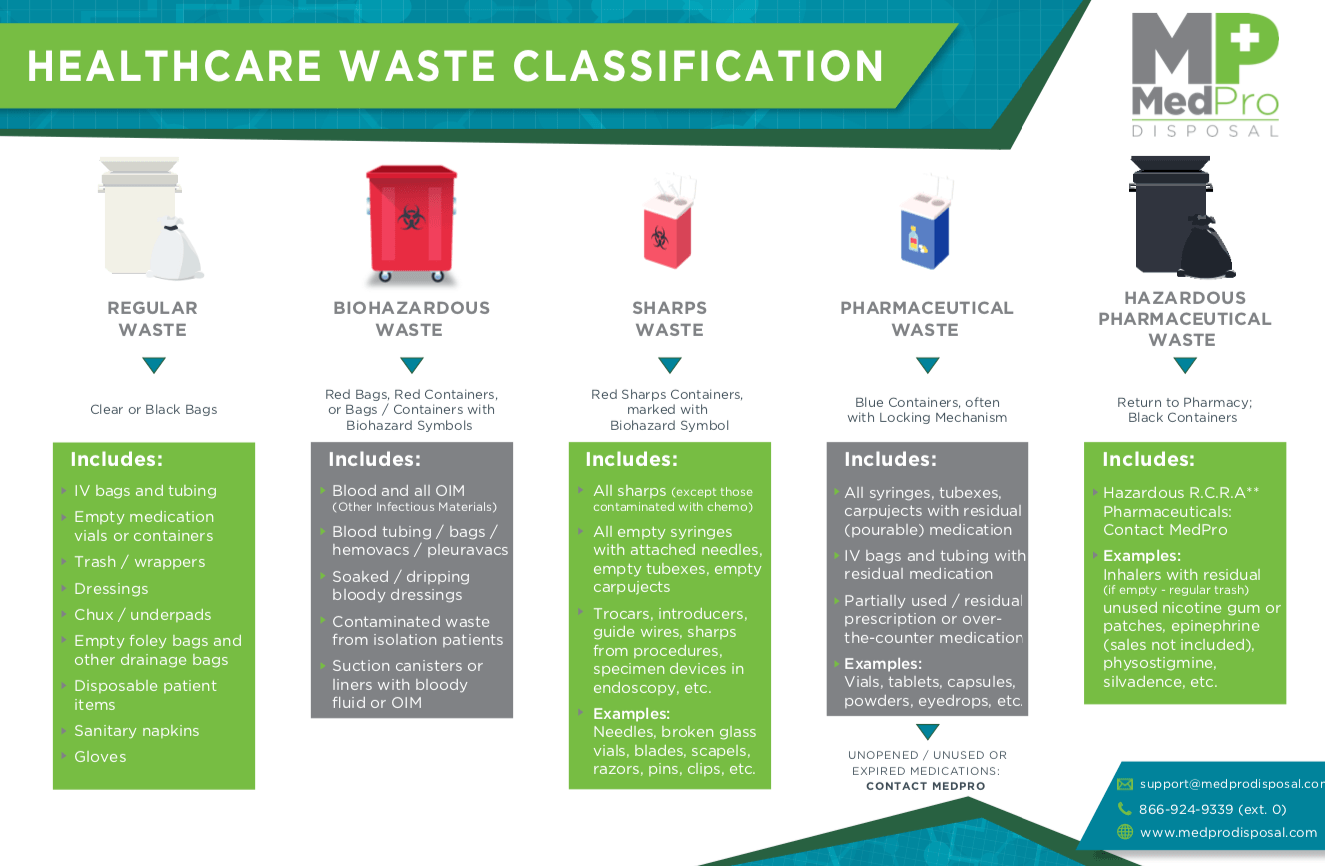Browsing Safety And Security: The Essential Guide to Medical Waste Disposal Finest Practices
Browsing Safety And Security: The Essential Guide to Medical Waste Disposal Finest Practices
Blog Article
Checking Out Different Garbage Disposal Options for a Cleaner Atmosphere
In the pursuit of a cleaner setting, the administration of waste disposal has become an important prime focus for sustainable development. With a wide variety of garbage disposal alternatives readily available, varying from typical land fill approaches to cutting-edge waste-to-energy technologies, the option of exactly how we manage our waste has significant ramifications for our world's wellness. By taking a look at the numerous strategies and methods utilized in recycling, composting, incineration, landfill administration, and waste-to-energy processes, a much deeper understanding of their influences and efficiency can be gotten. The mission for optimal garbage disposal techniques that prioritize ecological conservation while satisfying the needs of an expanding populace stays a pressing worry in today's globe.
Recycling Techniques
Carrying out reliable recycling techniques is critical in lessening waste and advertising sustainability in our environment. Recycling entails the procedure of transforming waste products into recyclable items to protect against unneeded disposal. Among the most typical recycling approaches is worldly healing, where products like paper, metal, glass, and plastic are accumulated, arranged, and processed to develop new products. This procedure not just conserves all-natural resources however additionally reduces energy usage and greenhouse gas discharges related to producing brand-new products from the ground up.
An additional vital recycling method is composting, which includes decomposing natural waste like food scraps and yard trimmings right into nutrient-rich dirt. By integrating these different recycling methods right into our waste monitoring practices, we can considerably minimize our environmental footprint and relocate towards a more lasting future.

Composting Strategies
Efficient waste administration practices, such as recycling approaches, lead the way for a cleaner environment, and currently, shifting the emphasis to 'Composting Techniques', we discover sustainable methods to disintegrate organic waste for ecological advantage. medical waste removal service.
Composting is a natural procedure that changes organic waste, like food scraps and lawn trimmings, right into a nutrient-rich soil amendment. The trick to effective composting depends on creating the right equilibrium of eco-friendly materials, such as vegetables and fruit scraps, and brownish products, like dried leaves and branches. These products disintegrate with the assistance of microbes, damaging down the waste into useful compost.
Conventional yard composting includes layering natural materials in a bin or stack and regularly transforming the combination to aerate it. By making use of composting strategies, we can decrease the amount of waste sent out to garbage dumps while creating a valuable item for enriching soil and supporting plant growth.
Incineration Cons and pros
Incineration, as a waste disposal technique, presents both benefits and drawbacks that warrant cautious consideration in the world of sustainable waste monitoring techniques. On the favorable side, incineration can dramatically minimize the quantity of waste, lessening the need for garbage dump room and possibly lowering greenhouse gas discharges.
Nonetheless, there are remarkable drawbacks to incineration. One major concern is the prospective launch of dangerous pollutants into the air, such as dioxins, heavy steels, and particle issue, which can have unfavorable effects on human health and wellness and the environment. Furthermore, the high preliminary financial investment and operational expenses of incineration facilities position economic difficulties, making it a much less cost-effective option compared to various other waste monitoring methods. Cautious surveillance and guideline are vital to mitigate these unfavorable effects and optimize the advantages of incineration as part of a detailed waste management approach.
Garbage Dump Monitoring Strategies
Garbage dumps play a critical role in waste monitoring and ecological conservation by supplying a control system for the disposal of solid waste materials. Efficient land fill monitoring approaches are necessary to mitigate ecological impacts and make certain the lasting sustainability of these garbage disposal websites. One crucial approach appertains waste compaction to make best use of making use of readily available room within the garbage dump (click here). By compacting the waste, the volume is decreased, enabling for more waste to be accommodated gradually.
In addition, the implementation of day-to-day cover techniques is important in reducing odors, preventing clutter, and minimizing the tourist attraction of insects. Treatment the disposed waste at the end of every day helps to contain smells and stop potential environmental contamination. Additionally, the surveillance of garbage dump from this source gas emissions and leachate degrees is critical in making sure that environmental criteria are satisfied which any type of prospective threats to surrounding communities are minimized.

Waste-to-Energy Technologies
One of the innovative approaches to squander management involves utilizing Waste-to-Energy innovations to convert solid waste into functional energy resources. Waste-to-Energy (WtE) innovations encompass a variety of processes that aim to extract power from waste products through thermal, chemical, or organic methods. This conversion procedure not just reduces the quantity of waste that winds up in landfills yet additionally generates beneficial power resources such as electrical energy, warm, or biofuels.
There are a number of methods of Waste-to-Energy conversion, including pyrolysis, gasification, and incineration. Incineration entails shedding waste at heats to produce warm and power. Gasification converts waste into a syngas, which can be used for power generation or chemical production. Pyrolysis breaks down organic products using heats in the absence of oxygen, generating char, bio-oil, and gas.
Executing Waste-to-Energy innovations can help mitigate environmental issues connected with conventional garbage disposal techniques while simultaneously supplying a renewable resource source. Mindful consideration has to be given to discharges control and making certain the sustainability of feedstock supplies for these innovations to be absolutely advantageous for a cleaner setting.
.jpg)
Final Thought
Finally, exploring different garbage disposal choices such as reusing, composting, incineration, garbage dump management, and waste-to-energy innovations is necessary for promoting a cleaner setting - click here. Each approach has its own benefits and obstacles, yet by utilizing a mix of these methods, we can work in the direction of lowering the quantity of waste that winds up in garbage dumps and inevitably add to a much more lasting future for generations ahead
With a wide variety of waste disposal options offered, ranging from standard land fill approaches to innovative waste-to-energy innovations, the option of exactly how we handle our waste has significant ramifications for our world's wellness. medical waste removal.Incineration, as a waste disposal approach, offers both benefits and negative aspects that warrant mindful factor to consider in the world of lasting waste monitoring practices.Garbage dumps play a critical function in waste management and environmental conservation by providing a control system for the disposal of strong waste materials. By compacting the waste, the quantity is minimized, enabling for more waste to be suited over time
One of the cutting-edge strategies to lose administration involves harnessing Waste-to-Energy technologies to transform solid waste right into usable energy resources.
Report this page